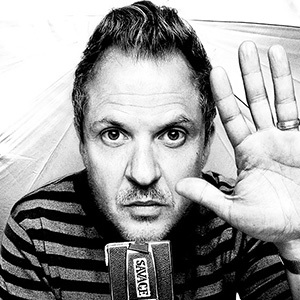
Platon
World-Renowned, Award-Winning Photographer; Founder, The People's Portfolio
A master photographer with a penchant for getting the world’s most powerful people to showcase their humanity, Platon proves that an image is just the beginning of the story. Platon is a gifted storyteller and master photographer, having photographed more world leaders than anyone else in history, including six American presidents. His evocative portraits showcase the stories of both the privileged and the deprived—to break down personal barriers and capture people’s truth. To him, taking a portrait is an intimate collaboration and a visual interview, both in front of and behind the camera. “My job is to tell the truth and to capture someone’s spirit on a certain day,” he says. “And it’s never the whole truth; it’s the truth I experience in a very intense and intimate fashion.” The British-born Platon has produced stunning portraits of some of the world’s most prominent figures—from Barack Obama and Mark Zuckerberg to Muhammad Ali and Hugo Chavez. His photographic works have graced the pages of an array of influential international publications, including The New York Times, Rolling Stone, Esquire, Vogue, and Vanity Fair. Over his storied career, Platon developed a special relationship with TIME, producing over 30 cover photos for the magazine. In 2007, he photographed Vladimir Putin for TIME’s Person of the Year cover. The image, featuring the inscrutable visage of the Russian leader, won him first prize at the World Press Photo Contest. In 2008, Platon became the staff photographer for The New Yorker, where he has produced a series of large-scale photo essays, including President Obama’s inauguration, the U.S. military, portraits of world leaders, and the civil rights movement. Additionally, he covered the emergence of civil society in Russia, which earned him a Peabody Award. Platon also creates haunting images of everyday people—including grieving parents who’ve lost their children to war, human rights defenders around the world, and survivors of sexual violence in the Congo. It’s this work that powers his nonprofit foundation, The People’s Portfolio, where he aspires to create a visual language that breaks barriers, expands dignity, fights discrimination, and enlists the public to support human rights around the world. “I’m turning the lens away from power to the people who have been robbed of power, to try and create a new set of cultural heroes that will not make us feel guilty but will inspire us to be better,” Platon says. His belief in the power of storytelling is rooted in a background in the arts. His enduring gift is his ability to communicate with everyone he encounters —seeing through the mask of leadership, celebrity, and even pain, to find the common thread that connects us all: our humanity. Platon has published two monographs. The first, Power, is an unprecedented anthology of 120 intimate portraits of world leaders from across the political spectrum to create a profound portrait of global power. Shot over a three-year period at the United Nations and captured with unique candor and insight, these photographs offer an intimate glimpse at the personalities behind the public faces of the world’s most powerful decision-makers. The other, Service, highlights the valor, emotions, and physical and psychological wounds of men and women in the U.S. military. His work has been exhibited at some of the world’s most prestigious galleries and museums, including the Scottish National Portrait Gallery in Edinburgh. In his presentations, Platon also shares the stories from his photo essays on the civil rights movement, his work with Human Rights Watch featuring the leaders of the Egyptian revolution, his photoshoot for TIME of Aung San Suu Kyi, and, most recently, his experience photographing Edward Snowden in Moscow for his exclusive interview with Wired magazine. With audiences, Platon is energetic, impassioned, and soul-stirring as he explores the highs and lows of humanity through his portraits. Using his platform as a speaker, he explores what it means to be a great leader, using his famous and everyday subjects as examples. Tying in his message of empathy, open dialogue, and unity, Platon encourages listeners to connect deeply and challenge perspectives—in order to find common ground and propel forward.
